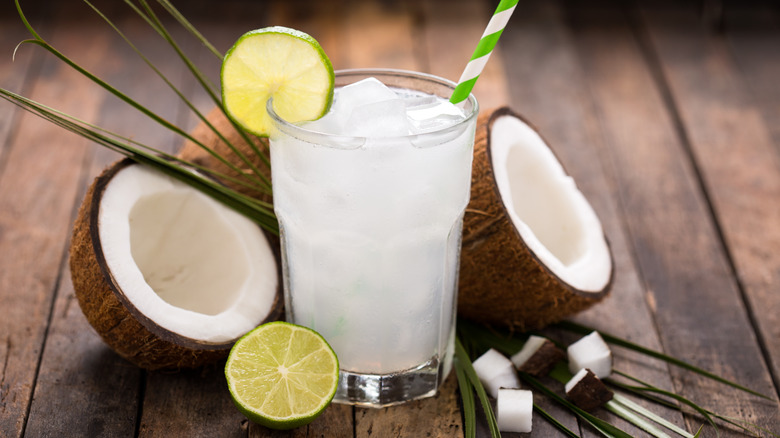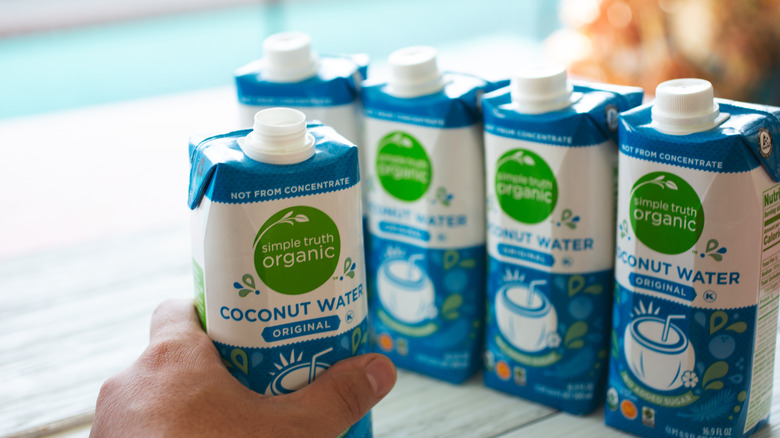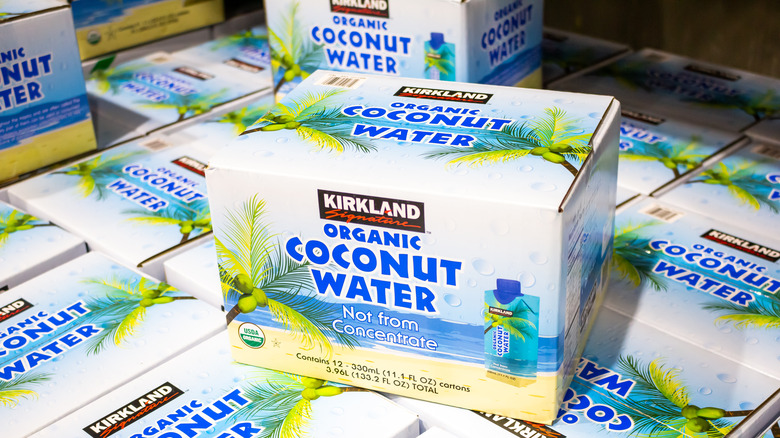The Hydration Myth You Shouldn't Believe About Coconut Water
Coconut water is not only a tasty beverage choice, but assuming you avoid brands with added sugars, it's a healthy one as well. It has few calories — only 19 per 100 grams, according to the U.S. Department of Agriculture – and virtually no fat or cholesterol. It's also been linked in studies to positive antioxidant qualities, and according to some research, it may even contribute to reduced blood sugar levels.
Coconut water has plenty of other positive benefits, too. But there is one area where it has been given too much credit. That's right: Coconut water is a bit overhyped with regards to its reputation for hydration. That's not to say that it isn't hydrating. The Mayo Clinic confirms that it is, and it contains electrolytes, which are needed to replace electrolytes lost when the body perspires. That doesn't mean it's the best post-workout choice, however; contrary to popular belief, coconut water is not as hydrating after intensive activity as most sports drinks.
The truth about coconut water and hydration
Hydration is not the same as health, and there's a difference between short and long-term hydration. Milk, for example, was shown to be more hydrating than water in a study that tracked beverages' effects over periods of a few hours. But, of course, reputable health outlets still tout water as the best option for hydration and the healthy functioning of bodily systems. Many recommend certain quantities which should be consumed daily.
So, to be clear, water is the best beverage for daily hydration, and you shouldn't assume coconut water is comparable in most situations. After all, it's not really water. Rather, it's a juice sourced from the clear liquid found in coconuts. When it comes to hydrating after participating in sports or intensive exercise, however, coconut water is akin to water. Both are viable options for hydration, but neither are comparable to sports drinks.
What do sports drinks have that makes them better for hydration after athletic performance than coconut water? A more consistent electrolyte profile, for one, as the electrolyte levels in coconut water tend to vary widely, according to the Cleveland Clinic. One of the electrolytes found in coconut water, for example — sodium (aka salt) — is enriched in some brands, which knocks its ratio to potassium out of balance. These elevated sodium levels may be fine for those engaging in extended, hour-long workouts, but are not ideal for shorter sessions.
The best times to hydrate with coconut water
As their name suggests, sports drinks are made with intense workouts in mind, and have an electrolyte profile that is specifically designed for this enhanced level of activity. So, they're hard to beat in these circumstances. A 2012 study may have helped to perpetuate the myth that coconut water is a comparable hydration aid to sports drinks in these situations, since as the Cleveland Clinic points out, it relied on data from sodium enriched coconut waters.
Under normal conditions, however, coconut water is a preferable hydration option. Sports drinks typically have artificial colors and added sugars, while most coconut waters do not. Coconut water — at least of the all-natural variety — is indeed quite hydrating, in addition to its many other positive health benefits.
Almost any time is a good time to drink coconut water, but it's particularly beneficial around mealtimes. Not only does it hydrate, but it mimics fullness, and thus discourages overeating. It is also thought to increase metabolism – a key reason it has been associated with weight loss – and it's a digestive aid, too, so you'll likely feel better after the meal is finished.



